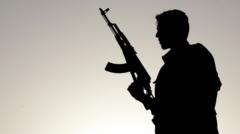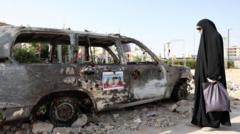As the PKK proposes to disband after four decades of conflict, families of fighters share their hopes and heartbreaks. While some celebrate the possibility of peace, others reflect on the costs of the decades-long struggle, leaving many uncertain about the future.
The Heartbreak of Kurdish Families: Waiting for Peace Amidst the PKK's Uncertain Future

The Heartbreak of Kurdish Families: Waiting for Peace Amidst the PKK's Uncertain Future
With the PKK's announcement to disband its insurgency, families of fighters are left in limbo, grappling with the memories of lost loved ones and the complexities of a potential peace process.
The families of Kurdish fighters now hold their breath as the Kurdistan Workers' Party (PKK) announces its intent to disband after more than 40 years of conflict with Turkey. For many, this declaration brings both hope and uncertainty. Leila, a mother whose son joined the PKK three years ago, yearns for a reunion, yet she remains apprehensive about the true implications of this momentous shift in policy.
Leila's son, an Iraqi-Kurd in his twenties, left their home to fight in the remote Qandil Mountains, where the PKK has long hid from Turkish forces. Though she rejoiced at the news, her excitement has faded as the promised peace discussions remain elusive. "If I could just see him once a year, I would be content," she laments, emphasizing the difficulties faced by families with loved ones entrenched in the conflict.
The PKK's declaration was initially met with praise, viewed as a crucial step towards resolving one of the world's longest-running conflicts. However, without a formal peace agreement or ceasefire, violence has persisted. As the PKK transitions its focus from seeking an independent Kurdish state to advocating for autonomy, families grapple with mixed emotions.
In conversations with the BBC, various families expressed pride in their loved ones' sacrifices, depicting a complicated relationship with the PKK. Rondek Takoor mourns her brother, who was killed two years ago fighting for the group. Her memories are tinged with both sorrow and pride, as she believes that their struggles are paving the way for negotiations.
Access to the Qandil Mountains, home to many PKK fighters, is tightly controlled, and while discussions have been hinted between Iraqi and Turkish officials regarding disarmament, the PKK remains skeptical of Turkey's intentions. PKK spokesman Zagros Hiwa insists that the group is committed to peace but demands the liberation of its leader, Abdullah Ocalan.
Yet, the intricacies of disarmament remain unaddressed. A senior PKK commander declared that disarmament is "not up for discussion," underscoring the challenges ahead for any potential agreement. Meantime, Turkish President Recep Tayyip Erdogan has framed the PKK's decision as a significant step towards a terror-free Turkey, though he faces skepticism about his true motives.
For many Kurdish families, political negotiations feel distant and less important compared to the emotional toll of separation and loss. For mothers like Leila, the hope remains that their sons will return home, driven away from the tough life in the mountains. As she contemplates moving from her home city, all she seeks is peace, not just for a nation, but for her family.






















